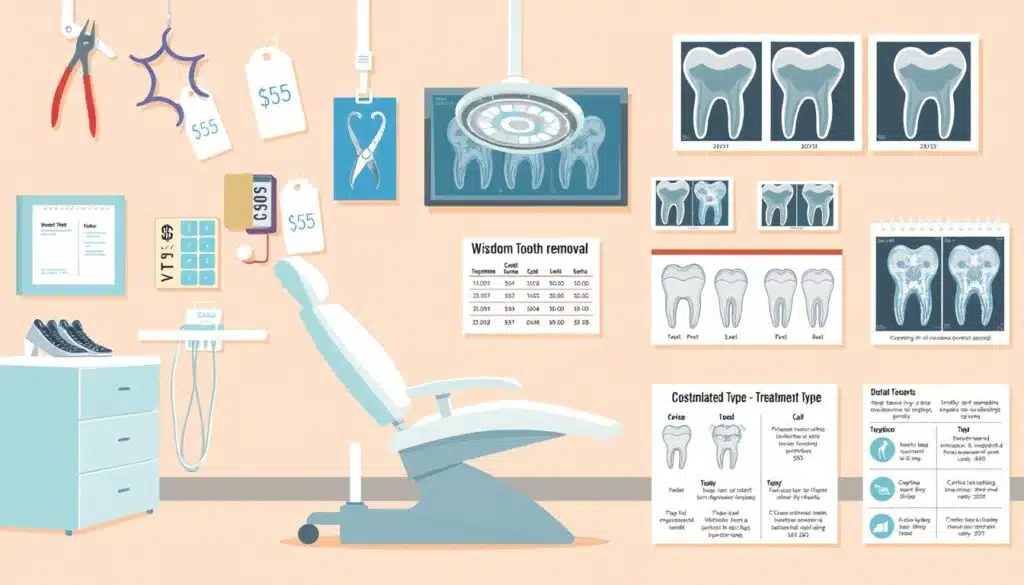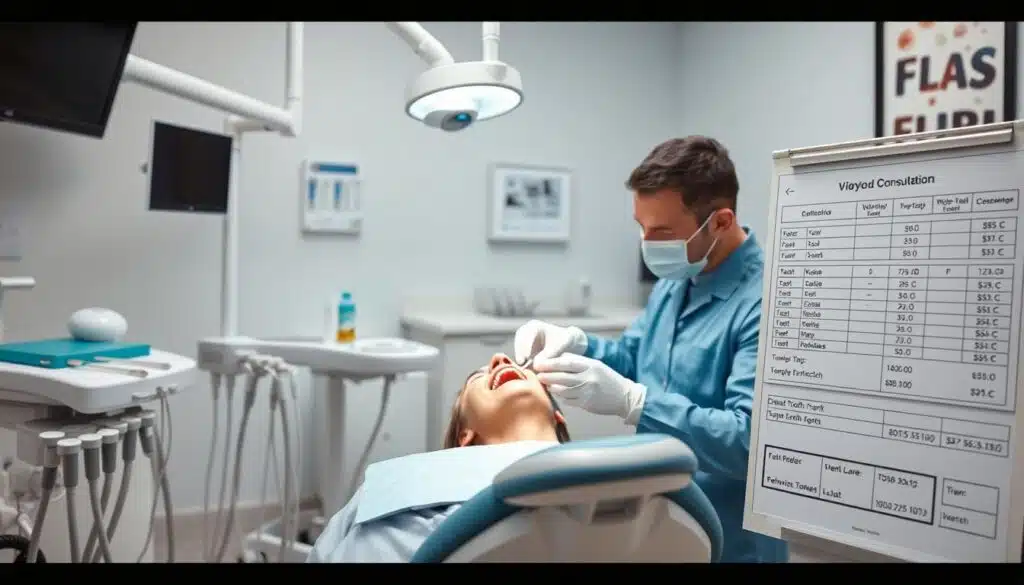Wisdom teeth are generally found in the back of your mouth, and they are usually in number four. Knowing about wisdom tooth removal cost without insurance is critical for adults needing this procedure. Wisdom teeth removal can lead to significant expenses. Costs vary a lot based on several factors.
Patients should expect to pay between $200 to $700 for each tooth. This depends on how hard the tooth is to remove.
The American Dental Association found that different removal methods change prices. Simple removals cost $75 to $200 per tooth. But, surgical removals can cost $225 to $1,100. Without insurance, you might have to pay all of this, which can be tough on your budget.
Many things affect the cost of extracting wisdom teeth without dental coverage. These include your oral health, tooth position, where you live, and your overall health. Knowing this helps you make a smart choice about removing your wisdom teeth. Costs can be from $641 to $4,000, depending on your situation.
Understanding these costs helps you plan better. This way, you can find affordable wisdom tooth extraction that fits your budget. And, you can take care of your teeth without breaking the bank.
Table of Contents
ToggleKey Takeaways
- Average cost of wisdom tooth removal per tooth without insurance is between $200 and $700.
- Simple extractions can range from $75 to $200, while surgical extractions may cost $225 to $1,100.
- Patients’ out-of-pocket expenses may vary from $641 to $4,000 depending on insurance coverage and extraction complexity.
- Factors influencing costs include oral health, age, and type of anesthesia required.
- Dental insurance typically caps wisdom tooth removal coverage at $1,000 to $1,500 annually.
- Geographic location significantly affects the pricing of wisdom teeth extractions.
- Understanding these costs allows for better financial planning for necessary dental procedures.
What is Wisdom Teeth
Wisdom teeth, also known as third molars, come in last, between 17 to 21 years old. They helped early humans chew tough foods. But, with smaller jaws today, they often cause dental problems.
Our diets changed, making wisdom teeth less needed. This can lead to issues like impaction or bad growth. Many people need to have them removed, showing they’re not as useful as they once were.
Removing wisdom teeth might be a good idea for many. Talking to a dentist can help decide if you need this.
| Condition | Description |
|---|---|
| Impaction | When wisdom teeth don’t have room to come in right, causing pain and infection. |
| Misalignment | Wisdom teeth can grow in weird ways, messing with other teeth. |
| Infection | Partially out wisdom teeth can trap bacteria, raising infection risks. |
| Cysts | Fluid-filled sacs can form around stuck wisdom teeth, harming nearby teeth or bone. |
The Importance of Removing Wisdom Teeth
Removing wisdom teeth is key to keeping your mouth healthy. If you don’t take care of them, you might face many problems. For example, you could feel a lot of pain because there’s not enough room for them to grow right.
When wisdom teeth don’t come out right, it can hurt a lot. It might even cause infections or damage to other teeth.
Ignoring wisdom teeth can also lead to cavities. This is because they can be hard to clean when they’re only partly out. Also, they can push against other teeth, making them crooked and needing orthodontic work.
It’s best to get your wisdom teeth taken out early to avoid these issues. Talking to a dentist can help figure out if you need to have them removed. Remember, waiting too long can make the procedure more expensive and complicated.
When Should You Remove Your Wisdom Teeth?
Knowing when to remove wisdom teeth is key. It’s about spotting dental signs and getting regular check-ups. Some signs mean you might need to have them pulled:
- Lack of space in your mouth can cause teeth to crowd and get crooked.
- Persistent pain could mean an infection or that the tooth is stuck.
- Partial eruption lets bacteria in, which can lead to cavities.
- Damage to nearby teeth happens when wisdom teeth push against them.
Talking to a dentist is crucial. They can tell you what to do based on your situation. Dentists use X-rays to see how your wisdom teeth are doing. This helps them figure out if you need to have them removed.
Going to the dentist regularly helps catch problems early. If your dentist finds something wrong, they can suggest what to do next. Making smart choices about when to remove wisdom teeth can help keep your mouth healthy.
Challenges of Wisdom Tooth Extraction
Wisdom tooth extraction comes with its own set of challenges. The procedure itself is complex. It can lead to infections, long recovery times, and dry socket.
Handling these challenges needs careful planning and attention. Some key factors include:
- Impacted Teeth: Many wisdom teeth don’t fully come out. This raises the risk of problems.
- Infection Risk: Infections can happen after surgery. They might need extra treatment or antibiotics.
- Dry Socket: This happens when the blood clot at the site doesn’t form right or gets lost. It causes a lot of pain.
- Swelling and Discomfort: Swelling and pain in the cheeks and area around the tooth are common. They can slow down recovery.
Knowing these challenges can help patients prepare for their extraction. It’s important to find an experienced dentist. They can handle risks and complications well. Following aftercare instructions can also help recovery go smoother.
Average Cost of Wisdom Tooth Removal In the U.S.
The cost to remove wisdom teeth in the U.S. can vary a lot. It can be between $720 and $4,000 without insurance. This price change depends on several things.
Things like how the wisdom teeth are positioned and the complexity of the removal matter. Also, where you live can affect the price.
Removing wisdom teeth that are fully out is usually cheaper. It might need only a little anesthesia. But, if the teeth are impacted, it’s more complicated and costs more.
Using special imaging helps figure out how hard the removal will be. This way, patients know what to expect and can plan for the cost.
- Nitrous oxide (Laughing Gas): $50 to $100
- IV sedation: $250 to $800
- General anesthesia: $500 to $1,200
After the procedure, you might need to pay for antibiotics and pain meds. This can cost between $20 and $100. Some dental plans offer discounts, saving you up to 50% on procedures like this.
Insurance can also help cover some of the costs. It usually has a yearly limit for dental care, like wisdom tooth removal. This limit can be between $1,000 to $1,500.
Prices can differ a lot between dentists. If you don’t have insurance, it’s smart to get quotes from several. You might also get discounts for paying upfront. There are even financing options to help with the cost, making dental care more accessible.
Factors Influencing Wisdom Tooth Removal Cost Without Insurance

The cost of removing wisdom teeth can change a lot. Knowing what affects the price helps plan for uninsured wisdom tooth extraction costs.
- Type of Extraction:
- Simple extractions cost less than surgical ones, especially for impacted teeth.
- Simple extractions cost $75 to $200 per tooth. Surgical ones cost $225 to $600.
- Geographic Location:
- Prices are higher in cities than in rural areas.
- In the U.S., simple extraction costs vary: $125 in the East, $110 in the West, $100 in the North, and $90 in the South.
- Complexity of the Procedure:
- How many teeth and the complexity of the surgery affect the cost.
- Removing all four wisdom teeth costs more than taking out one or two.
- Anesthesia:
- Choosing anesthesia can raise costs. General anesthesia is pricier due to extra fees.
- X-rays and Diagnostics:
- Pre-surgery X-rays and tests add to the bill.
- Consultation Fees:
- Initial dentist visits to discuss the procedure may have fees.
- Post-Operative and Oral Hygiene Care:
- Following doctor’s orders can lead to extra costs for medications or special care.
In summary, understanding these wisdom tooth extraction factors helps plan for uninsured wisdom tooth extraction costs. Talking to dental experts can help find ways to save money. This benefits your health and wallet.
Types of Extractions and Their Costs
Understanding the different types of wisdom tooth extraction is key. Each type has its own cost. The complexity of the extraction affects the price. Here’s a look at the types of extractions you might need:
Simple Extractions
Simple extractions are for wisdom teeth that have come in fully. They can be easily accessed. This procedure costs between $150 and $350 per tooth. If you need all four removed, it can cost $500 to $1,000. Insurance can lower these costs a lot.
Surgical Extractions
Surgical extractions are for impacted wisdom teeth. These teeth haven’t come in fully or are hidden under the gum. Costs range from $300 to $800 per tooth. This includes the cost of evaluations and anesthesia.
Soft Tissue and Bony Impaction
There are two types of impact: soft tissue and bony. Soft tissue impaction means the tooth is partly covered by gum. Bony impaction means it’s fully covered in bone. Costs vary by type and complexity.
For soft tissue impaction, prices are $300 to $650 per tooth. For bony impaction, it’s $500 to $800 per tooth. Removing all four can cost $1,900 to $3,000.
Wisdom Tooth Extraction Costs by State
The cost of wisdom teeth removal varies across the United States. Many factors, like where you live and the dental clinic, affect the price. Knowing wisdom teeth removal costs by state helps patients make better choices. They can find cost-effective dental clinics for tooth extraction.
The price for removing an erupted wisdom tooth is between $200 and $900. Removing an impacted tooth costs more. Here’s a table showing average costs by state.
| State | Average Cost for Erupted Tooth | Average Cost for Soft Tissue Impacted Tooth | Average Cost for Partially Bony Impacted Tooth | Average Cost for Fully Bony Impacted Tooth |
|---|---|---|---|---|
| California | $400 | $600 | $750 | $1,200 |
| Texas | $350 | $550 | $600 | $1,000 |
| Florida | $300 | $500 | $650 | $1,100 |
| New York | $450 | $650 | $800 | $1,500 |
| Illinois | $370 | $530 | $700 | $1,300 |
Other costs include dental exams, X-rays, and anesthesia. It’s important to think about these when looking for wisdom teeth removal. By comparing prices and looking for affordable options, people can find cost-effective dental clinics for tooth extraction.
Discounts and Financial Assistance for Dental Extractions

For those needing wisdom tooth removal, there are ways to help with the cost. These options make dental care more affordable, especially for those without insurance. By looking into these choices, patients can find ways to pay for extractions through plans and programs.
Payment Plans for Uninsured Patients
Dental clinics offer wisdom teeth removal payment plans for those without insurance. These plans let patients pay over time. This helps avoid big upfront costs and keeps dental health on track.
- Flexible monthly payment options
- Low or no interest rates
- Budget-friendly arrangements tailored to individual needs
CareCredit Options
CareCredit is another option for financing dental care. It’s a credit card made for health and wellness costs. It can be used for financial assistance for dental extractions, like wisdom tooth removal. Getting approved is easy, offering quick financial help.
- Low monthly payments
- No interest if paid within promotional periods
- Wide acceptance among dental providers
| Financial Assistance Option | Description | Benefits |
|---|---|---|
| Payment Plans | Structured monthly payment options offered by dental clinics. | Flexible, low-interest rates, tailored to individual budgets. |
| CareCredit | A credit card available for medical expenses, including dental extractions. | Low monthly payments, no interest with promotional periods. |
Self-Pay Wisdom Tooth Removal Expenses
Understanding self-pay wisdom tooth removal expenses involves a few key factors. Costs vary based on the complexity of the extraction and the anesthetic used. On average, removing one wisdom tooth costs between $250 to $600.
Removing all four wisdom teeth costs more, averaging $1500 to $2000. This is especially true when general anesthesia is needed.
For those looking for cheaper options, a simple extraction of one tooth can start at $200. However, the cost goes up with the complexity and number of teeth removed. Doctors often recommend removing all four teeth at once to avoid future problems.
Other costs to think about include:
- Basic cleaning and polish: $75–$200
- Panoramic X-rays: $100–$200
- Medications: Costs vary for pain and antibiotics.
Dental centers may offer membership plans. These plans can include cleanings, exams, and x-rays at little or no extra cost. This can help make wisdom tooth removal more affordable in the long run.
With this knowledge, patients can better understand the costs of wisdom tooth removal. This helps them plan their dental care financially.
How to Manage Costs Without Insurance
Managing the cost of wisdom tooth removal can be tough. With many dental expenses, finding affordable options is key. Here are some ways to help:
- Shop Around: Look at prices at different dental clinics. Rates can vary a lot.
- Dental Schools: Dental schools offer cheap procedures by students. It’s a big savings.
- Insurance Alternatives: Check out financing plans from dental schools. They have payment plans or work with third-party lenders.
- Dental Assistance Programs: Find local charities or non-profits for dental help. They help those who can’t afford it.
Knowing the costs can help a lot. For example, a simple tooth pull costs $70 to $250. But, a surgical pull can be $180 to $550 without insurance. Knowing these prices helps plan your budget.
Here’s a table showing the average costs for wisdom teeth removal:
| Type of Extraction | Average Cost Without Insurance | Average Cost With Insurance |
|---|---|---|
| Simple Extraction | $100 to $300 | $300 to $900 |
| Surgical Extraction | $250 to $1,200 | $450 per tooth |
| Soft Tissue Impaction | $200 to $800 | N/A |
| Partial Bony Impaction | $250 to $900 | N/A |
| Full Bony Impaction | $300 to $1,200 | N/A |
By using these tips, you can handle the costs of wisdom tooth removal without insurance. This leads to better financial choices for your dental health.
Conclusion
Wisdom tooth removal costs vary a lot. This depends on how complex the procedure is and where you live. Simple extractions cost between $75 and $200 per tooth. But, surgical extractions can cost more, from $225 to $600.
Other costs like consultation fees, imaging, and anesthesia can also add up. These extra costs can make the total bill much higher.
Looking into financial help is key if you have to pay out of pocket. Insurance can help a lot, but there are other options too. Discount dental plans and payment plans can make things easier.
Getting advice from dental experts is very important. Knowing what to expect helps you make good choices. Being ready and informed makes the whole process easier and better for your teeth.








